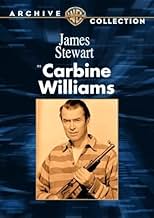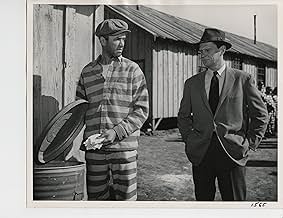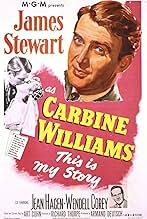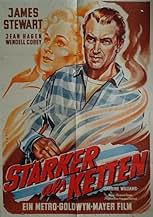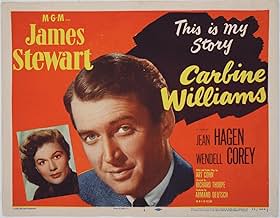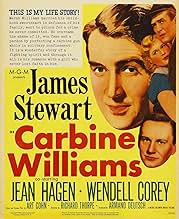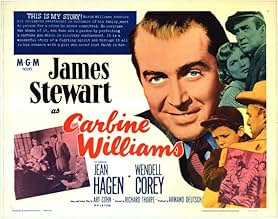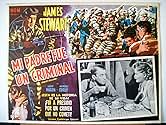Aggiungi una trama nella tua linguaDavid Marshall Williams is sent to a prison farm where he works in the tool shop and eventually develops the precursor of the famous M-1 Carbine automatic rifle used in World War II.David Marshall Williams is sent to a prison farm where he works in the tool shop and eventually develops the precursor of the famous M-1 Carbine automatic rifle used in World War II.David Marshall Williams is sent to a prison farm where he works in the tool shop and eventually develops the precursor of the famous M-1 Carbine automatic rifle used in World War II.
- Premi
- 1 vittoria in totale
Recensioni in evidenza
I enjoyed this movie; my favorite part probably being the friendship that slowly develops between inmate Williams and Captain Peoples ("Cap"). Watch for a good scene towards the end where Cap makes his friendship for Williams loud and clear - a true symbol of the trust he had in the alleged killer.
The story of the man, his family, and his friends, is the real story here. The fact that he invented a new kind of gun is a side-note. Interesting, though, the ability he had to build things with bare essentials and his own two hands.
Good movie. Not the typical "everyman" Stewart, but he does a great job in the part.
Jean Hagen (perhaps best known for her role as the ditzy silent-movie star opposite Gene Kelly in "Singin' in the Rain") plays Stewart's wife in the movie.
In "Carbine Williams", Stewart plays the title role, a moonshiner who is convicted of murdering a Federal agent, and who then gets sent to a chain gang after being implicated in a prison murder. His rebellious nature brings him into conflict with the warden at the prison farm, Captain Peoples (Dracut MA's own Wendell Corey), until he discovers a means of channelling his anger and bitterness.
The real-life David Marshall Williams did indeed invent the improvements in firearms which led directly to the development to the M-1 carbine, the weapon which helped to win World War II. And he did it while serving a long prison sentence for murder. The story is interesting enough on its own, but Stewart brings an intensity and heart to the role which makes it even more fascinating than a mere telling of the facts would be.
One of many excellent films James Stewart made during the 1950's, this one is somewhat obscure, not particularly well-remembered today. But it deserves to be.
Before writing this review I took a look at the wikipedia article on Marsh Williams and found that MGM had stuck pretty close to telling the real story about Williams. For the farmer the Great Depression began after the Armistice was signed and the food they produced was no longer needed to feed troops. Many like Marsh Williams turned to making moonshine, not just as a way of distilling spirits for personal use, but for economic survival. That fact cannot be emphasized enough in telling the Carbine Williams story.
The federal men were seen as taking the bread out of the farmer's mouths in the North Carolina hills and other such places and the rural folk reacted accordingly. Williams was convicted of murdering a federal agent during a raid. He didn't get the death penalty because no one could tell who really fired the fatal shot, but as he was part of the group he shared responsibility. He got thirty years.
Williams was a skilled machinist and after he got over the bitterness of his incarceration with the help of a friendly warden he worked out the design of the weapon that later became the M-1 carbine rifle used by our armed forces in World War II.
James Stewart in developing his character as Marsh Williams borrowed a whole lot from some of the characters in his Anthony Mann westerns. This is not the 'aw shucks' Jimmy we all identify him with, but a very bitter man, as bitter even as George Bailey when he thinks the world's deserted him in It's A Wonderful Life.
Jean Hagen plays the Donna Reed like wife here who with a man incarcerated has a lot more troubles than Ms. Reed dealt with. The third major role is that of Wendell Corey's warden whose belief in Stewart is sustained.
Carbine Williams tread earlier along the same lines that Birdman of Alcatraz did. And in depicting the moonshining community, Carbine Williams shows folks that could have been the ancestors of the family Robert Mitchum was part of in Thunder Road. It's a good story about a man who found his soul and his work in the oddest of places.
Lo sapevi?
- QuizIn the film, all of the men working on the still with Williams were white. But in reality, it was five African-American men, all of whom testified against Williams at trial.
- Citazioni
Marsh Williams: But there isn't enough time Maggie. You can have enough of everything else. You can enough food, you can enough land, you can even have enough money, but you never can have enough time, because it's the only thing you can't save.
- Curiosità sui creditiEPILOGUE: "The film concludes with the following written acknowledgment: 'Metro-Goldwyn-Mayer gratefully acknowledges the cooperation of the North Carolina prison authorities and wishes to state that the penal system existing in North Carolina today has been improved immeasurably over conditions depicted in the picture.'"
- Versioni alternativeOriginally filmed in black-and-white, it is also shown in a computer colorized version.
- ConnessioniReferenced in Sid & Judy (2019)
I più visti
- How long is Carbine Williams?Powered by Alexa
Dettagli
- Data di uscita
- Paese di origine
- Lingua
- Celebre anche come
- Carbine Williams
- Luoghi delle riprese
- 275 Winchester Avenue, New Haven, Connecticut, Stati Uniti(opening establishing shot of the Winchester Repeating Arms Co. building - converted to apartments in 2014)
- Azienda produttrice
- Vedi altri crediti dell’azienda su IMDbPro
Botteghino
- Budget
- 1.111.000 USD (previsto)
- Tempo di esecuzione1 ora 32 minuti
- Colore
- Proporzioni
- 1.37 : 1
Contribuisci a questa pagina


